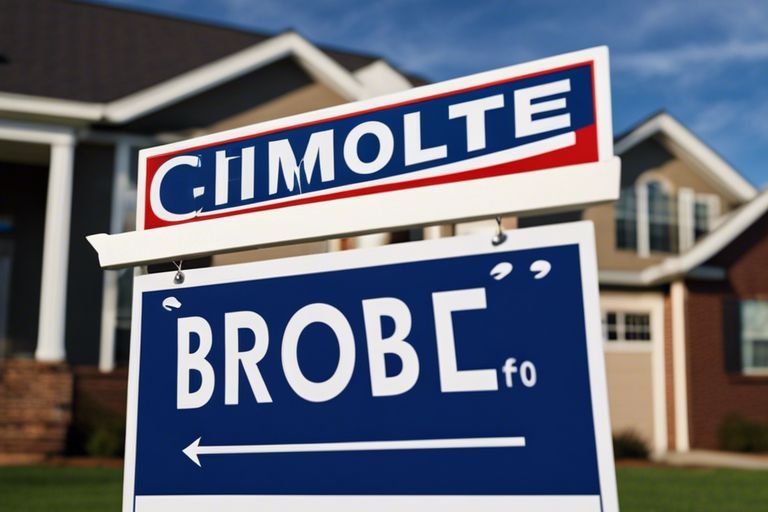There’s an intriguing trend happening in Charlotte’s real estate market that you should be aware of. As you navigate the bustling market looking for your dream home, understanding the current home prices in Charlotte is crucial. Let’s examine into the latest data and insights to help you make informed decisions about buying or selling a home in this thriving southern city.
Key Takeaways:
- Rapid Increase: Home prices in Charlotte have seen a rapid increase in recent years.
- Strong Demand: The strong demand for housing in Charlotte has contributed to the rise in home prices.
- Seller’s Market: Charlotte is currently considered a seller’s market, with prices expected to continue rising.
Historical Context
Charlotte’s Real Estate Market Evolution
For many years, Charlotte has been a rapidly growing city with a dynamic real estate market. Your journey through the historical context of home prices in Charlotte will reveal a fascinating evolution of the city’s real estate scene. From humble beginnings as a small trading post to becoming a major financial hub in the Southeast, Charlotte’s real estate market has seen significant changes over the years.
Key Events Impacting Home Prices
For a deeper understanding of the fluctuations in home prices in Charlotte, it’s important to examine key events that have shaped the city’s real estate market. Factors such as economic booms, recessions, and major infrastructure developments have all played a role in influencing home prices in the Queen City. By looking at these key events, you can gain valuable insights into the trends and patterns that have impacted home prices in Charlotte over the years.
Plus, by understanding how historical events have affected home prices in Charlotte, you can better prepare for the future and make informed decisions when buying or selling property in the city. Whether you’re a first-time homebuyer or a seasoned investor, knowing the historical context and key events that have shaped Charlotte’s real estate market can give you a competitive edge in navigating the fluctuations of home prices.
Current Market Trends
There’s always a buzz surrounding the real estate market in Charlotte, North Carolina. Whether you’re looking to buy a home or just curious about the current trends, staying informed about the median home prices and neighborhood-specific analyses is key.
Median Home Prices in Charlotte
The median home price in Charlotte is currently around $300,000. This figure represents the midpoint of all home prices in the area, giving you a good idea of what to expect when house hunting. Keep in mind that this number can fluctuate based on various factors such as location, size, and amenities.
Neighborhood-Specific Price Analysis
Price is not a one-size-fits-all in Charlotte. Each neighborhood has its own unique characteristics that can impact home prices. From the upscale properties in Myers Park to the trendy condos in South End, understanding the specific price range of the area you’re interested in is crucial for making an informed decision.
Another aspect to consider in neighborhood-specific price analysis is the future development plans in the area. Gentrification, new retail spaces, or upcoming infrastructure projects can all influence property values, making it important to look beyond the current prices.
Seasonal Fluctuations in Home Prices
On average, home prices in Charlotte tend to spike during the spring and summer months when the weather is warmer, and more buyers are actively searching for homes. Conversely, prices may dip slightly during the fall and winter seasons as the market slows down. Understanding these seasonal fluctuations can help you time your home purchase or sale effectively.
Prices
Factors Influencing Home Prices
Despite various factors affecting home prices, there are key elements that play a significant role in determining the fluctuations in the real estate market in Charlotte. Understanding these factors can offer insight into the dynamics of home prices in the region.
- Supply and Demand Dynamics
- Economic Indicators (GDP, Unemployment Rate)
- Government Policies and Regulations
Supply and Demand Dynamics
To comprehend the fluctuations in home prices in Charlotte, you must consider the fundamental principle of supply and demand. When the demand for homes outweighs the available supply, prices tend to rise as buyers compete for limited housing options. Conversely, an oversupply of homes can lead to a decrease in prices as sellers strive to attract buyers in a competitive market. Understanding the balance between supply and demand is crucial in predicting trends in home prices in Charlotte.
Economic Indicators (GDP, Unemployment Rate)
Indicators such as the Gross Domestic Product (GDP) and the Unemployment Rate can have a significant impact on home prices in Charlotte. A strong GDP growth often translates to higher incomes and increased consumer confidence, leading to a rise in home prices. Conversely, high unemployment rates can dampen consumer spending and decrease demand for housing, resulting in stagnation or even a decline in home prices.
Factors like GDP and the Unemployment Rate serve as necessary metrics for understanding the overall economic health of a region, which directly influences the real estate market and home prices in Charlotte.
Government Policies and Regulations
Any shifts in government policies and regulations can have a substantial impact on the real estate market and ultimately influence home prices in Charlotte. Changes in tax laws, zoning regulations, or mortgage interest rates can directly affect the affordability and demand for housing in the area. It’s necessary to stay informed about any policy changes that could potentially impact the real estate landscape in Charlotte.
Prices in the real estate market are not solely determined by the property itself but are also influenced by external factors such as government interventions and regulations that shape the overall housing market in Charlotte.
Demographic Insights
Population Growth and Age Distribution
All around Charlotte, you can see the impact of population growth and age distribution on home prices. The city has been experiencing a steady increase in population, attracting residents of all ages. This diverse demographic landscape plays a significant role in shaping the real estate market, influencing the types of properties available and their corresponding prices.
Income Levels and Affordability
For many residents in Charlotte, income levels and affordability are crucial factors when considering where to purchase a home. The city offers a range of housing options to cater to different income brackets, making it a desirable location for individuals and families alike. The affordability of homes in various neighborhoods often correlates with the income levels of the residents in those areas.
This correlation between income levels and home prices can influence your decision-making process when looking for a property in Charlotte. Understanding the relationship between these factors can help you navigate the real estate market more effectively and find a home that aligns with your budget and financial goals.
Lifestyle and Amenities Impact on Home Prices
Prices for homes in Charlotte are also influenced by the lifestyle and amenities available in different neighborhoods. Areas with convenient access to amenities such as parks, shopping centers, restaurants, and entertainment venues tend to have higher property values. The quality of schools and public services in the vicinity can also impact home prices, making certain neighborhoods more desirable to potential buyers.
Affordability is a key consideration when evaluating how lifestyle and amenities affect home prices in Charlotte. While access to desirable amenities can drive up property values, it’s important to assess how these factors align with your budget and priorities. Finding a balance between your desired lifestyle and affordability is crucial in making an informed decision about purchasing a home in Charlotte.
Neighborhood Spotlight
Uptown Charlotte: Luxury Living
Neighborhoods in Uptown Charlotte offer luxury living with high-rise condos, upscale restaurants, and vibrant nightlife. If you’re looking for a bustling urban lifestyle with easy access to entertainment and amenities, Uptown Charlotte is the place for you. Home prices in this area tend to be higher due to the desirable location and luxurious living spaces.
NoDa: Artsy and Trendy
An artsy and trendy neighborhood, NoDa is known for its eclectic art galleries, live music venues, and unique dining spots. Here, you can immerse yourself in a vibrant community filled with creativity and culture. Home prices in NoDa are more affordable compared to Uptown Charlotte, making it an attractive option for young professionals and artists looking for a lively neighborhood to call home.
Living in NoDa, you’ll have access to local breweries, hip cafes, and indie boutiques that give the neighborhood its distinctive character. The community atmosphere in NoDa is welcoming, with regular art crawls, music festivals, and cultural events that bring residents together.
SouthPark: Family-Friendly Suburbs
To escape the hustle and bustle of the city, SouthPark offers family-friendly suburbs with top-rated schools, spacious homes, and beautiful parks. If you’re looking for a quieter setting with excellent amenities and a strong sense of community, SouthPark could be the ideal neighborhood for you. Home prices in SouthPark may be higher, but the quality of life and family-friendly environment make it a worthwhile investment.
For instance, SouthPark Mall is a popular shopping destination with a variety of upscale stores and dining options. The neighborhood also features recreational facilities, green spaces, and community events that cater to residents of all ages. Living in SouthPark provides a balance of tranquility and convenience, making it an attractive choice for families looking to settle down in Charlotte.
Expert Opinions and Predictions
Real Estate Agent Insights
On your quest to understand the fluctuations in Charlotte’s housing market, seeking the advice of real estate agents can provide valuable insights. These professionals have firsthand knowledge of the local market trends, buyer preferences, and seller behaviors. Real estate agents can offer personalized advice tailored to your specific needs, whether you are buying or selling a home. By tapping into their expertise, you can make more informed decisions and navigate the dynamic real estate landscape in Charlotte with confidence.
Economist Forecasts
One way to gain a macroeconomic perspective on Charlotte’s home prices is by considering economist forecasts. Economists analyze a myriad of factors such as interest rates, employment trends, and housing supply to predict future market movements. Their forecasts can give you a bird’s eye view of the broader economic conditions impacting home prices in Charlotte. By staying informed on economist predictions, you can gain valuable insights into the potential trajectory of the housing market and plan your real estate transactions accordingly.
Insights
Industry Trends and Future Outlook
With advancements in technology, changing consumer behaviors, and evolving demographics, the real estate industry is constantly in flux. Keeping abreast of industry trends and future outlook can help you anticipate market changes and make strategic decisions. Whether it’s understanding the impact of remote work on housing preferences or the influence of sustainability on property values, being attuned to industry trends can give you a competitive edge in Charlotte’s real estate market.
Economist
Economists play a crucial role in shaping our understanding of the real estate market by providing data-driven insights and forecasts. Their analyses help us make sense of complex economic factors influencing home prices in Charlotte and guide us in making sound investment decisions. By paying attention to economist perspectives, you can glean valuable information to inform your real estate strategies and navigate the ever-evolving landscape of Charlotte’s housing market.
Conclusion
With this in mind, it’s clear that home prices in Charlotte have been on the rise in recent years, making it an attractive market for both buyers and sellers. Whether you’re looking to invest in real estate or purchase a home for yourself, it’s important to stay informed about the current market trends and fluctuations.
By keeping an eye on factors such as interest rates, housing inventory, and local economic conditions, you can make a more informed decision when it comes to buying or selling a home in Charlotte. With the right knowledge and guidance, you can navigate the real estate market with confidence and find the perfect home at a price that fits your budget.
Q: What is the average home price in Charlotte?
A: The average home price in Charlotte is currently $350,000.
Q: What factors contribute to fluctuations in home prices in Charlotte?
A: Several factors can contribute to fluctuations in home prices in Charlotte, including market demand, interest rates, economic conditions, and new developments in the area.
Q: Are home prices in Charlotte expected to continue rising?
A: While nothing can be predicted with certainty, many real estate experts forecast that home prices in Charlotte will continue to rise in the near future due to the city’s growing population, job opportunities, and overall desirability as a place to live.



